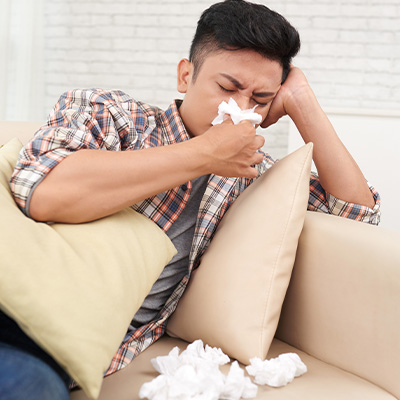Symptoms of Allergic Rhinitis

Nasal stuffiness (congestion), sneezing and runny nose

Itchy nose, throat and eyes

Headaches, sinus pain and dark circles under the eyes

Increased mucus in the nose and throat

Fatigue and general feeling of discomfort
Allergic Rhinitis FAQ
Allergic rhinitis is an allergic reaction to tiny particles in the air called allergens. When you breathe in allergens through your nose or mouth, your body reacts by releasing a natural chemical called histamine. Several indoor and outdoor allergens cause AR. Common causes include dust mites, mold, pet dander and pollen from trees and plants.
Symptoms of AR include sneezing, nasal congestion and irritation of the nose, throat, mouth and eyes. Allergic rhinitis is not the same as infectious rhinitis, otherwise known as the common cold.
Allergies are inherited (passed down through families). You’re more likely to have AR if you have a parent or family member with allergies. People who have asthma or eczema are more likely to develop AR.
Symptoms of AR include:
• Nasal stuffiness (congestion), sneezing and runny nose.
• Itchy nose, throat and eyes.
• Headaches, sinus pain and dark circles under the eyes.
• Increased mucus in the nose and throat.
• Fatigue and malaise (general feeling of discomfort).
• Sore throat from mucus dripping down the throat (postnasal drip).
• Wheezing, coughing and trouble breathing.
Your healthcare provider will examine you, ask about your symptoms and evaluate you for other conditions, such as a cold or asthma. To measure your antibodies to specific allergens, your provider may take a blood sample and send it to a lab for testing. This blood test is called an immunoglobulin E (IgE) test. It can detect all types of allergies, including food allergies.
Your provider may recommend a skin prick test to determine what allergens are causing your symptoms.
This common test is painless and accurate, though it may be a little uncomfortable. Your provider places a small sample of different allergens on your skin (usually on your forearm or back) and scratches or pricks the skin with a needle. Scratching the skin allows the allergen to get under the surface.
If you’re allergic to the allergen, the area will become red, itchy and irritated in 15 to 30 minutes. You may develop raised, hive-like welts called wheals that show an allergic reaction. A skin prick test is a safe, effective way to determine which allergens are causing your symptoms.
Several allergy medications can improve symptoms and help you live with AR. These treatments come in many forms, including liquids, pills, eye drops, nasal sprays and injections. Talk to your provider before taking any medication, especially if you’re pregnant or have other health concerns.
There is no way to prevent AR, but lifestyle changes can help you live with allergies. You can relieve AR symptoms by avoiding irritants as much as possible. To reduce symptoms, you should:
• Avoid touching your face and rubbing your eyes or nose.
• Close windows in your home and car during the spring, summer and early fall when pollen counts are higher.
• Enclose pillows, mattresses and box springs in dust mite covers.
• Keep pets off couches and beds, and close doors to bedrooms you don’t want them to enter.
• Use filters in your vacuum cleaner and air conditioner to reduce the amount of allergens in the air.
• Wash your hands often, especially after playing with pets.
• Wear a hat and sunglasses to protect your eyes from pollen when you’re outside. Change your clothes as soon as you come indoors.
Yes, there is a connection between allergic rhinitis and asthma and some evidence show they even overlap. It is estimated that 40% of AR patients had asthma and about 30%-80% of asthmatic patients reported AR. It’s best to keep the symptoms in control to avoid worsening of airway diseases. It is advisable to maintain the use of intranasal corticosteroids (nasal spray) for patients with AR as advised by your doctor.
Allergic Rhinitis Articles
Allergic Rhinitis Videos

Nebulization for Kids: Usage & Maintenance
Ensure your kid's medicine intake with these tips for properly using a nebulizer.

Nebulization for Kids: Preparing the Nebulizer
Using a nebulizer for your kid is easy, especially with these prep reminders.

Using Nebulizers at Home
For safe nebulization at home, watch these tips on what to do before, during, and after using your nebulizer.












